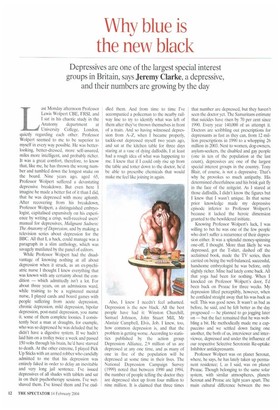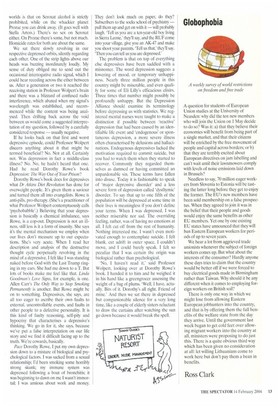Why blue is the new black
Depressives are one of the largest special interest groups in Britain, says Jeremy Clarke, a depressive, and their numbers are growing by the day Last Monday afternoon Professor Lewis Wolpert CBE, FRSL and I sat in his chaotic study in the Anatomy department at University College, London, quietly regarding each other. Professor Wolpert seemed to me to be superior to myself in every way possible. He was betterlooking, better-dressed, more self-assured, miles more intelligent, and probably richer. It was a great comfort, therefore, to know that, like me, he has thrown the wrong number and tumbled down the longest snake on the board. Nine years ago, aged 65, Professor Wolpert suffered a devastating depressive breakdown. But even here I imagine he made a better fist of it than I did, that he was depressed with more aplomb. After recovering from his breakdown, Professor Wolper( a distinguished embryologist, capitalised expansively on his experience by writing a crisp, well-received users' manual for depressives, Malignant Sadness: The Anatomy of Depression, and by making a television series about depression for the BBC. All that I, a hack, could manage was a paragraph in a slim anthology, which was savagely mutilated by the panel of editors.
While Professor Wolpert had the disadvantage of knowing nothing at all about depression when it struck, as an ex-psychiatric nurse I thought I knew everything that was known with any certainty about the condition — which admittedly isn't a lot. For about three years, on an admissions ward, while training to be a registered mental nurse, I played cards and board games with people suffering from acute depression, chronic depression, mild depression, bipolar depression, post-natal depression, you name it, some of them complete loonies. I consistently beat a man at draughts, for example, who was so depressed he was deluded that he didn't have a digestive system. If we hadn't laid him on a trolley twice a week and passed 150 volts through his brain, he'd have starved to death. At the other extreme, I played Pick Up Sticks with an armed robber who candidly admitted to me that his depression was entirely faked in order to delay an inevitable and very long jail sentence. I've issued depressives of all shades with tablets and sat in on their psychotherapy sessions. I've wetshaved them. I've kissed them and I've cud
dled them. And from time to time I've accompanied a policeman to the nearby railway line to try to identify what was left of them after they've thrown themselves in front of a train. And so having witnessed depression from A–Z, when I became properly, tackle-out depressed myself two years ago, and sat at the kitchen table for three days staring at a vase of dying daffodils, I at least had a rough idea of what was happening to me. I knew that if I could only rise up from the table and totter down to the doctor, he'd be able to prescribe chemicals that would make me feel like joining in again.
Also, I knew I needn't feel ashamed. Depression is the new black. All the best people have had it: Winston Churchill, Samuel Johnson, John Stuart Mill, Mr Alastair Campbell, Elvis, Job. I knew, too, how common depression is, and that the problem is getting worse. According to statistics published by the action group Depression Alliance, 2.9 million of us are depressed at any one time, and as many of one in five of the population will be depressed at some time in their lives. The National Depression Campaign Survey (1999) noted that between 1990 and 1994, the number of people telling the doctor they are depressed shot up from four million to nine million. It is claimed that three times that number are depressed, but they haven't seen the doctor yet. The Samaritans estimate that suicides have risen by 70 per cent since 1990. Every year 140,000 of us attempt it. Doctors are scribbling out prescriptions for depressants as fast as they can, from 12 million prescriptions in 1990 to a whopping 26 million in 2003. Next to women, dog-owners, asylum-seekers, the disabled and gay people (one in ten of the population at the last count), depressives are one of the largest special interest groups in the country. Tony Blair, of course, is not a depressive. That's why he provokes so much antipathy. His determined cheerfulness and his brisk gait fly in the face of the zeitgeist. As I stared at those daffodils, I didn't know the figures but I knew that I wasn't unique. In that sense prior knowledge made my depressive episode inferior to Professor Wolpert's because it lacked the heroic dimension granted to the bewildered initiate.
Knowing Professor Wolpert's luck, I was willing to bet he was one of the few people who don't suffer a recurrence of their depression either. It was a splendid money-spinning one-off, I thought. More than likely he was depressed, got the T-shirt, dashed off the acclaimed book, made the TV series, then carried on being the well-balanced, successful, handsome embryologist he was before, only slightly richer. Mine had lately come back. All that yoga had been for nothing. When I knocked on Professor Wolpert's door, I'd been back on Prozac for three weeks. My depression lifted perceptibly, however, when he confided straight away that his was back as well. This was good news. It wasn't as bad as before, he said, and he felt better as the day progressed — he planned to go jogging later on — but the fact remained that he was wobbling a bit. He methodically made me a cappuccino and we settled down facing one another, the both of us, interviewer and interviewee, depressed and under the influence of our respective Selective Serotonin Re-uptake Inhibitor antidepressants.
Professor Wolpert was on planet Seroxat, where, he says, he has lately taken up permanent residence; I, as I said, was on planet Prozac. Though belonging to the same solar system, with similar atmospheres, planets Seroxat and Prozac are light years apart. The main cultural difference between the two worlds is that on Seroxat alcohol is strictly prohibited, while on the whackier planet Prozac you can drink away. (It goes well with Stella Artois.) There's no sex on Seroxat either. On Prozac there's some, but not much. Homicide rates for both are about the same.
We sat there slowly revolving in our respective depressed orbits, silently regarding each other. One of the strip lights above our heads was buzzing inordinately loudly. My sense of duty obliged me to send out the occasional interrogative radio signal, which I could hear receding across the ether between us. After a generation or two it reached the receiving station in Professor Wolpert's brain and there was a blizzard of confused radio interference, which abated when my signal's wavelength was established, and recommenced while the content was being analysed. Then drifting back across the void between us would come a suggested interpretation of my question, followed by a carefully considered response — usually negative.
If he looks back on that first and worst depressive episode, could Professor Wolpert discern anything about it that might be termed beneficial? No. Not at all. Certainly not. Was depression in fact a middle-class illness? No. No, he hadn't heard that one. Had he read Dorothy Rowe's book Depression: The Way Out of Your Prison?
Dorothy Rowe's book does for depressives what Dr Atkins Diet Revolution has done for overweight people. It's given them a saviour and turned them all into evangelists. Rowe is anti-pills, pro-therapy. (She's a practitioner of what Professor Wolpert contemptuously calls `psychobabble'.) Believing that your depression is basically a chemical imbalance, says Rowe, is a cop-out. Depression is not an illness, still less is it a form of insanity. She says it's the mental mechanism we employ when our lives don't measure up to our expectations. She's very acute. When I read her description and analysis of the destructive thought cycle perpetually revolving in the mind of a depressive, I felt like I was standing naked before God with the Last Trump ringing in my ears. She had me down to a T. But lots of books make me feel like that. Linda Goodman's Love Signs, for example, is one. Allen Carr's The 04 Way to Stop Smoking Permanently is another. But Rowe might be on to something. Depressives, she says, are all too eager to ascribe their own faults to external, uncontrollable events, and faults in other people to a defective personality. It is this kind of faulty reasoning, self-pity and hypocrisy that characterises a depressive's thinking. We go in for it, she says, because we've put a false interpretation on our life story and we find it difficult facing up to the truth. We're cowards, basically.
Pace Dorothy Rowe, I put my own depression down to a mixture of biological and psychological factors. I was sacked from a sexual relationship; I'd been smoking some horribly strong skunk; my immune system was depressed following a bout of bronchitis; it was beginning to dawn on me I wasn't immortal; I was anxious about work and money. They don't look much on paper, do they? Subscribers to the socks school of psychiany — pull them up and get on with it — will probably laugh. 'Tell us you are a ten-year-old boy living in Sierra Leone,' they'll say, and the RUF come into your village, give you an AK-47 and make you shoot your parents. 'Tell us that,' they'll say. 'Then you can tell us you are depressed.'
The problem is that on top of everything else depressives have been saddled with a misnomer. The word depression suggests a lowering of mood, or temporary unhappiness. Nearly three million people in this country might be miserable, and even qualify for some of Eli Lilly's efficacious elixirs. Three times that number might possibly be profoundly unhappy. But the Depression Alliance should examine its terminology before depressing us with statistics. We registered mental nurses were taught to make a distinction if possible between 'reactive' depression that had been caused by an identifiable life event and 'endogenous' or spontaneous depression, a more severe illness often characterised by delusions and hallucinations. Endogenous depressives lacked the motivation required to commit suicide, but you had to watch them when they started to recover. Commonly they regarded themselves as damned or having committed an unpardonable sin. These terms have fallen into disuse. Today it is fashionable to speak of 'major depressive disorder' and a less severe form of depression called 'dysthymie disorder. To say that up to one fifth of the population will be depressed at some time in their lives is meaningless if you don't define your terms. When I was depressed, I was neither miserable nor sad. The overriding feeling, rather, was of having no emotions at all, I felt cut off from the rest of humanity. Nothing interested me. I wasn't even motivated enough to contemplate suicide. I felt blank, cut adrift in outer space. I couldn't move, and I could barely speak. I felt so peculiar that I was certain the origin was biological rather than psychological.
'No, I haven't read it,' said Professor Wolpert, looking over at Dorothy Rowe's book. I handed it to him and he weighed it in his hand like a greengrocer assessing the weight of a bag of plums. 'Well, I have, actually. Bits of it. Dorothy's all right. Friend of mine.' And then we sat there in depressed but companionable silence for a very long time, like a couple of elderly sisters reluctant to draw the curtains after watching the sun go down because it would break the spell.



































































 Previous page
Previous page